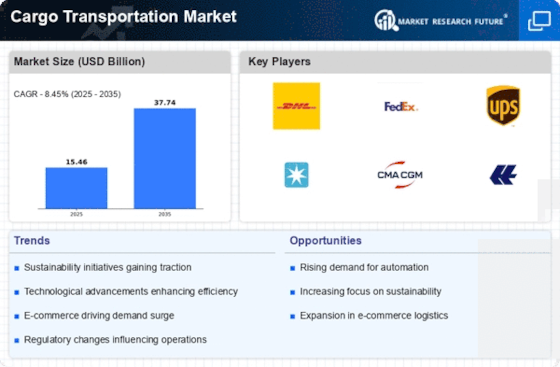Top Industry Leaders in the Cargo Transportation Market

The cargo transportation market, a vast ocean where commodities and consumer goods sail from port to port, churns with a fierce competitive current. From towering container ships traversing oceans to nimble trucks weaving through city streets, players of all sizes grapple for control of this vital lifeline of global trade. Let's cast our anchor and explore the strategies, market forces, and recent developments shaping this dynamic landscape.
Strategies Adopted: Steering Through the Competition:
-
Scalable Titans: Industry giants like Maersk, CMA CGM, and Deutsche Bahn invest in expanding their fleets, acquiring logistics companies, and developing multimodal solutions. Think mega-ships for high-volume ocean routes, integrated rail and truck networks, and digital platforms that streamline cargo tracking and management. -
Cost-Conscious Contenders: Regional players like DP World and Yusen Logistics focus on affordability, utilizing fuel-efficient vessels, optimizing routes, and offering flexible pricing models to cater to budget-conscious shippers. This strategy ensures they remain competitive in cost-driven sectors. -
Niche Navigators: Smaller players carve out their niches by specializing in specific routes, cargoes, or modes of transport. Some focus on air freight for time-sensitive goods, others cater to oversized cargo like wind turbine blades, and some specialize in inland transportation with dedicated trucking fleets. This targeted approach allows them to excel in specialized areas.
Factors that Drive the Market Tides:
-
Global Trade Winds: The ebb and flow of international trade, influenced by geopolitical factors, economic trends, and consumer demand, directly impacts the cargo transportation market. Rising trade volumes can lead to booming business, while economic downturns can bring choppy waters. -
Technological Tsunamis: Advancements like automation, blockchain technology, and AI-powered logistics optimization are transforming the industry. Think automated container terminals, real-time cargo tracking, and predictive maintenance systems that reduce delays and improve efficiency. -
Sustainability Sirens: Environmental concerns and regulations are pushing the market towards greener solutions. This includes utilizing cleaner fuels, optimizing routes for reduced emissions, and investing in renewable energy sources for ports and terminals. -
E-Commerce Eddies: The surge in online shopping creates a growing demand for fast and efficient cargo transportation, especially for air freight and last-mile delivery solutions. Companies that can adapt to the changing needs of e-commerce giants will thrive in these turbulent waters.
Key Players:
- Crowley Maritime Corporation (US)
- Expeditors (US)
- Schumacher Cargo Logistics Inc. (US)
- Orient Overseas Container Line Limited (Hong Kong)
- ISDB Logistik GmbH (Germany)
- Manhattan Associates (US)
- Amerijet International Airlines (US)
- DSV Panalpina A/S (Germany)
- Bohnet OmbH (Germany)
- APL (US)
- Panalpina Weltransport Holding AG (Switzerland)
- Accenture PLO (Ireland)
- CEVA Logistics (UK)
Recent Developments:
October 2023: Maersk launches a new line of fuel-efficient container ships powered by biofuels, showcasing the growing adoption of sustainable solutions in ocean freight.
November 2023: CMA CGM partners with a technology company to develop a blockchain-based platform for secure and transparent cargo tracking, enhancing efficiency and trust in the supply chain.
December 2023: Deutsche Bahn invests in a network of automated freight terminals across Europe, aiming to boost efficiency and reduce labor costs in rail cargo transportation.
January 2024: DP World expands its inland logistics network in Africa with new trucking routes and warehouses, catering to the growing demand for efficient intra-regional trade.










